|
|
The director of STELLA and ZORBA THE
GREEK, Michael Cacoyannis, went to town with an emotional documentary of the
tragic events surrounding the 1974 Turkish military intervention of Cyprus.
The “Fox Lorber” distributed video
box begins:
“In July 1974, the Turkish Army invaded the Republic of Cyprus, forcing
thousands of Greeks into displaced persons camps and causing the deaths of
thousands more. Upon hearing the devastating reports from his homeland,
director Michael Cacoyannis rushed from London to Cyprus in order to document
the horrible events on film.”
It’s from “Attila ‘74, The Rape of Cyprus,” readily available
in some American public libraries... that’s where I spotted my copy.
|
|
|
 |
Michael Cacoyannis tells us in a voiceover:
This is Cyprus... my homeland. I am Greek, and my name is Michael Cacoyannis. Cyprus
has been inhabited by Greeks for more than 3,000 years. They survived many conquests.
Roman, Frank, Venetian, Turkish, British... always emerging with their Greek heritage
intact. When I left the island as a young man, it was still a British colony. The Greek
inhabitants outnumbered the Turks by four-to-one, as they do today; only then they lived
together, side-by-side, in peace.
This is like the Armenian rank and file passionately believing ancient Armenia has been
“stolen” by the Turks, even though the ones who were in charge of the lands at the
time were the Byzantines... nearly a thousand years ago! Just because Greeks happen to
live in Cyprus does not make it a Greek island... especially when Greece had nothing to do
with Cyprus since the days of the Roman Empire, and earlier (while juggled between
Assyrians, Sumerians, Phoenicians, Egyptians, Persians; never, to my knowledge, was Cyprus
a
possession of a Greek government.
Of all the conquerors, only the Turks ... where the island of Cyprus (taken from the
Venetians) is only a stone’s throw away... had the tolerance and magnitude to allow the
Greeks to maintain their heritage; they could have easily displaced the Greeks with their
own people (unlike the other conquerors who lived far away, and did not have the
wherewithal to do so... similar to what China has been doing with Tibet and the United
States with Hawaii -- in only a hundred years, or less.) Therefore, if the Greeks
maintained their majority and preserved their customs and language after many centuries of
Turkish rule, then let’s not give credit elsewhere... as if the Greeks succeeded in
maintaining their heritage against all odds.
Moving on with the documentary's content:
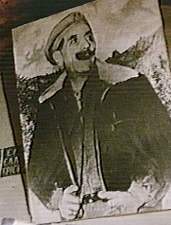 |
|
Colonel
Grivas on a poster
|
After the war, the Greeks, rallying around Archbishop Makarios,
pressed the British for some solution that would lead to their national dream of enosis,
union with Greece. In 1955... trouble exploded. A small group of underground fighters
called Eoka took to arms led by Grivas — a Cyprus born colonel of the Greek army. The
British exiled Makarios... and for four long years (with an army that eventually rose to
40,000) they tried to crush Eoka, and failed. Where they did succeed was in rallying the
support of the Turkish minority by using enosis as a red cloth. The tradition of peaceful
coexistence collapsed in violence, and for the first time the Turks demanded partition as
the only protection of their rights.
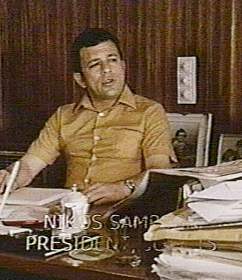 |
|
Coup leader
Nikos Sampson |
So Michael Cacoyannis is admitting there was peaceful coexistence
between the two communities, and the ones who “fired the first shot” were the
Greeks. And look at this... he’s already making it sound like Enosis was just an excuse
for big bad Turkey to move in. When the Greek Cypriots were fanatically massacring the
Turks left and right during the 1950s, you had better believe partition was the only way
to guarantee their survival... as history has borne out. (After the 1974 coup, coup leader
Sampson admitted his plan was to commit genocide against the Turks: "Had Turkey
not intervened I would not only have proclaimed 'enosis,' I would have annihilated the
Turks in Cyprus." Eleftherotipia, Feb. 26, 1981.)
This is exactly what happened with the Armenians. Peaceful coexistence for long centuries
until some fanatics stirred the masses with nationalism and racism, leading to massacres
and violence against the Turks... bringing the counter-reaction that led to the Armenians
and Greeks holding the short end of the stick. When that happens, they can’t handle the
responsibility for their own criminal actions, and thus it becomes easy to point fingers
at the Terrible Turk. They’ve got the money and the sympathy of the West, and thus it
becomes easy for Michael Cacoyannis to produce a propaganda film, leading The London
Times to gush (according to a blurb on the video box), “One of the best
records of history in the making.” Not if you define “history” as a
dispassionate account, London Times!
-------------------------
(Let's not forget we owe The London Times
a ton of gratitude for being, in at least one instance, “One of the best records of
history in the making”; they are the ones who published Boghos Nubar's 1919 letter admitting the Armenians were "belligerents
de facto," during W.W.I.)
|
Archbishop Makarios
|
The struggle
ended in 1960 with the signing of the Zurich agreement, which granted Cyprus
independence and excluded both Enosis and partition. The constitution, which gave
the Turkish minority a veto and considerable administrative powers was guaranteed by
Greece and Turkey... Makarios returned from exile to become the first president of
the Republic of Cyprus.
Unfortunately, all of those rights and powers were quickly ignored by the fanatical
Greeks, as they went on to persecute the Turks at the first opportunity.
Michael Cacoyannis then interviews Archbishop Makarios.
“...Enosis was kept alive, even by yourself. Why?”
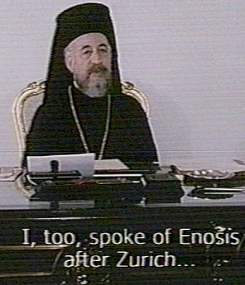 |
|
His
Beatitude, Archbishop Makarios |
“Enosis always had been the aspiration of
all Greek Cypriots and a deeply rooted one. I, too, spoke of Enosis after Zurich,
voicing this aspiration. But I stressed that the desirable is not always obtainable.
Enosis is not feasible, as long as Turkey is opposed to it. Because of this, we
should fortify and protect the independence of Cyprus.”
This is why religion and politics should never mix, as religious politicians
inevitably destroy the credibility of religion, which implies truth and morality. On
the other hand, a politician, in order to appease his flock, is forced to be untrue.
Makarios was not the voice of reason, telling his fanatical Greeks to calm down. In
contrast, he was irresponsibly encouraging Enosis, thus fostering further violence.
When he speaks of “fortify(ing) and protect(ing) the independence of Cyprus,”
was he acting as the President of ALL the Cypriot people?
In his memoirs, American Undersecretary of State George Ball said: "Makarios's
central interest was to block off Turkish intervention so that he and his Greek
Cypriots could go on happily massacring Turkish Cypriots.”
“Who is to blame for the constitutional failure?”
“The seeds of discord lay within the constitution itself which contained divisive
elements. But its failure was precipitated by political demagogues in Cyprus and in
Greece who played on the desires of our people. But the blame lies even more with
Turkey, which had territorial designs from the beginning and discouraged the Turkish
Cypriots from working with the Greeks within the constitution.”
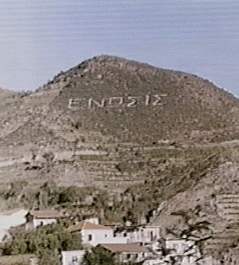 |
|
Carved
on a Cypriot mountain: ENOSIS
|
This false “Man of God” would have served
his cloth better had he remembered, THOU SHALT NOT BEAR FALSE WITNESS AGAINST THY
NEIGHBOR. He deserves credit for laying a little blame against the Greeks, while
neglecting to mention he was one of the demagogues who played on the desires of the
people, by advocating Enosis. But he can’t bring himself to really lay the blame
where it fully belongs, so first he has the nerve to blame the treaty. Of COURSE the
constitution is going to have divisive elements, since it was born out of the
divisiveness perpetuated by Greeks. “But the blame lies even more with Turkey”?
Brother! Exactly when did Turkey foster these “territorial designs”? Can he
point to any record of the Turkish government making noises about “Enosis” with
Turkey, before Greek Cypriots began to slaughter Turks? The only reason for the
partition that took place was to protect the Turkish Cypriots from getting wiped
out, as Turkey was legally entitled to do. If Turkey did not act... well, you’ve
already read Sampson’s genocidal intentions.
On July 28, 1960 Makarios, the Greek Cypriot president, said: "The
independence agreements do not form the goal -- they are the present and not the
future. The Greek Cypriot people will continue their national cause and shape their
future in accordance with THEIR will."
In a speech on Sept. 4, 1962 at Panayia,
Makarios said, "Until this Turkish community forming part of the Turkish
race that has been the terrible enemy of Hellenism is expelled, the duty of the
heroes of EOKA can never be considered terminated."
|
| |
Michael Cacoyannis: “In 1963, intercommunal fighting
broke out...”
There is no mention of who fired the first shot. The reader has only one guess.
As former British parliamentarian Michael Stephen reminded Michael B. Christides, the
Charge d'affaires of the Greek Embassy in Ankara, in 1999: “The assertion by Mr.
Christides (May 10) that there was no ethnic cleansing or attempted genocide of Turkish
Cypriots by Greek Cypriots is ridiculous. Until influential Greek Cypriots come to terms
with the appalling behavior of their community toward the smaller Turkish Cypriot
community and stop trying to persuade themselves and the world that each side was as much
to blame as the other, there will be no reconciliation in Cyprus.”
Isn’t that exactly what Michael Cacoyannis is attempting to do here? Trying to persuade
“the world that each side was as much to blame as the other.” (Actually, when all is
said and done, he’d rather you believe only one side was most to blame... and it’s not
the side with the Greeks.)
In November 1963 the Greek Cypriots demanded the abolition of no less than eight of the
basic articles that had been included in the 1960 agreement for the protection of the
Turkish Cypriots. The Turkish Cypriots, naturally, refused to agree. The aim of the Greek
Cypriots was to reduce the Turkish Cypriot people to the status of a mere minority, wholly
subject to the control of the Greek Cypriots, pending ultimate destruction or expulsion of
the Turkish Cypriots from the island.
"When the Turkish Cypriots objected to the amendment of the
Constitution, Makarios put his plan into effect, and the Greek Cypriot attack began in
December 1963," wrote Lt. Gen. George Karayiannis of the Greek Cypriot militia
("Ethnikos Kiryx" 15.6.65). The general was referring to the notorious "Akritas"
plan, which was the blueprint for the annihilation of the Turkish Cypriots and the
annexation of the island to Greece.
“The Turks of Nicosia and Famagusta looked to Ankara for arms and other support.”
Yes, it’s called “self preservation”... with the Greeks ready to slice and dice at
every turn.
|
Back to the Makarios
interview
|
“Your Beatitude...Was the presence of the Greek military necessary, and when
did it become dangerous?”
“I did not request but accepted their presence on the island as a deterrent to
possible Turkish aggression. In retrospect.... I was wrong.... It became hazardous
from the day the Greek military junta seized power in Greece.”
Sure, because that nutty junta did not intend to include Makarios in the mix. His
own Greek Cypriot National Guard overthrew Makarios and installed Nicos/Nikos
Sampson as "president," when they made their disastrous move in 1974. What
a phony man of baloney. And get this... he just innocently and passively “accepted”
the Greek military’s presence on the island.
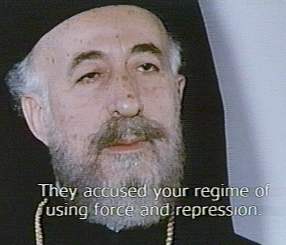 |
|
His
Beatitude, Archbishop Makarios |
Michael Cacoyannis: “It took all of
Makarios’ diplomatic skill to safeguard the independence of the flourishing Cyprus
from the designs of Greece on one hand, and Turkey on the other. And for seven
years, he succeeded.”
What an honorable hero this Makarios was, huh? Among the elements he was holding at
bay was Turkey’s designs... only we are not offered any evidence of these supposed
designs.
Years before the Turkish intervention, Professor Ernst Forsthoff, the neutral
president of the Supreme Constitutional Court of Cyprus, told Die Welt on Dec. 27,
1963: "Makarios bears on his shoulders the sole responsibility for the
recent tragic events. His aim is to deprive the Turkish community of their
rights." In an interview with the UPI press agency on Dec. 30, 1963 he
said, "All this happened because Makarios wanted to take away all
constitutional rights from the Turkish Cypriots."
The filmmaker reads a 1974 letter penned by Makarios to the Greek government
complaining of their support of EOKA-B (formed by the returning officer, Grivas), of
corrupting the Cypriot National Guard, of Athens conspiring against the archbishop,
of dividing the Greek Cypriots and "driving them to destruction through
fraternal bloodshed,” and of “an invisible hand stretching all the way
from Athens, seeking to extinguish my earthly existence.”
Michael Cacoyannis tells us the Cyprus radio announced the death of Makarios: “We
stress this is a purely internal affair... between Greeks and Greeks.”
Now this is important. We are being reminded of “fraternal bloodshed,”
and of fighting “between Greeks and Greeks.” Let’s make a note of this,
as the filmmaker will ask a one word question at the end of his film’s epilogue.
Makarios relates the story of the taking of his palace (where he says, “the
first shots were fired.” Indeed, the first shots. And Turkey’s
mysterious “designs” were nowhere in sight). After the false reportage of his
death, he gives a rousing radio speech to his people (that is, his Greek Cypriot
people... since he had regarded the Turkish Cypriots as non-entities) as their “elected
leader,” and at the side of the people as their “comrade and standard-bearer in
the common struggle.” THUS, HE ENCOURAGED FURTHER GREEK VS. GREEK FIGHTING against
the “puppet president of the Republic of Cyprus.”
He then tells of his troubled conscience of leaving the island since that would
appear as though he were “deserting” his people “to save (his) own skin.”
Yet that is the course of action he ultimately took, justifying his decision as
being better able to “work against the insurgents more freely from outside Cyprus.”
(Work against them how? If it weren’t for Turkey’s moving in, perhaps there
would still be a military junta in Greece today.)
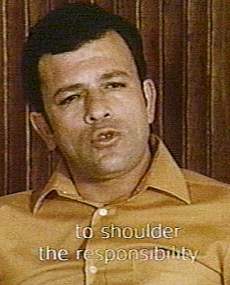 |
|
Strongman
Sampson speaks... unaware a
Turkish Delilah is in the wings, ready
to clip his locks. |
We are then treated to an interview with Nikos
Sampson who says he took over the presidency to “avert bloodshed and restore
unity,” failing to mention the Greek bloodshed mainly began after his arrival.
(The Turkish bloodshed was an ongoing matter of course, and the last thing on this
killer’s mind was to avert that bloodshed.) He then babbles something about
recognizing those imprisoned and tortured by Makarios were now out for blood (“To
Makarios’ friends! To the communists!”) and he worked to prevent a “fratricidal
war” by imposing “law and order on all levels.”
We then hear sad music and witness crosses in a graveyard.
|
| The
"Invasion" |
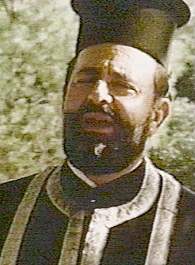 |
|
Eyewitness
Priest
|
A priest who performed many funerals in the 24
years he worked for a cemetery recounts as the victims”:
“Soldiers, 110. About 400 refugees and civilians. Greek officers came here
right after the coup. They were frantic, more like drugged Turks. Drunk or
something, their blood wasn’t Greek. They kept yelling. They wanted to get the
dead buried double-quick. They made no sense. They had a truck... kept throwing out
the dead... Here, boys in their teens. How were they to blame?”
We are then treated to a wrenching account of a policeman’s ordeal at the hands of
the soldiers. When he is finally taken to the hospital, he reports: “I saw the
notorious lieutenant Danos threatening doctors and nurses not to touch us, as anyone
for Makarios should bleed to death.”
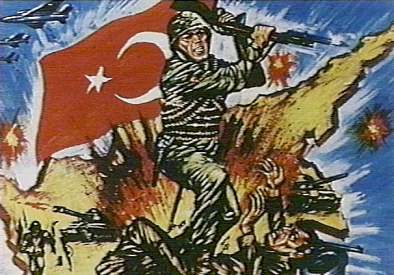
With sounds of bombs in the background, Turkey’s “invasion” on July 20th is
declared. “Within three days, a ceasefire is called. The Greek junta collapses
and Greece returns to democracy. Sampson resigns, and is replaced by Glafkos
Clerides as acting president. A conference is held at Geneva but it disintegrates
when the Turks, abandoning their peace operation line, demand territorial changes on
a ‘take it or leave it’ basis. On August 14th, the Turks attack again... within
three days, the Attila line, as the Turks chose to call it, has sliced Cyprus in
two. (CUE SOUNDS OF IMAMS PRAYING.) Beyond the Turkish flags, Northern Cyprus
has been turned into a huge concentration camp... Women and children are caged up in
schools and churches. The men are shipped off to prison camps in Turkey, or
disappear (DRAMATIC PAUSE).... forever.”
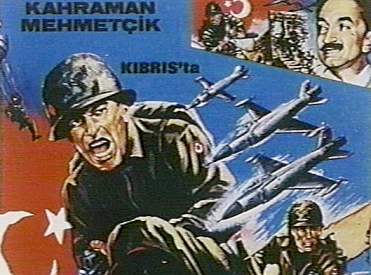
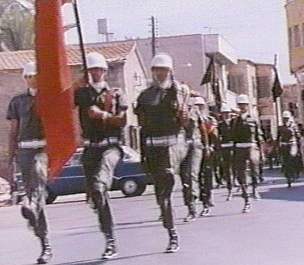 |
|
These
are pretty much the only "Turks" we see in the film
|
Shots of a crying woman lamenting over her lost
son are juxtaposed with the occupying Turkish troops marching in a drill.
A Kyrenian woman whose husband is a doctor explains she was forced into the Dome
Hotel, enclaved with 800 people, not allowed out, “not even to the hotel beach.”
(!)
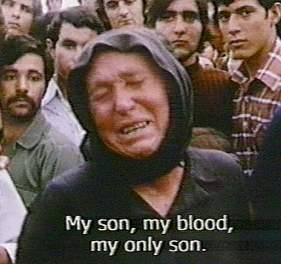 |
|
Crying
woman lamenting over her lost son |
The camera tracks over the suffering souls,
with sad music playing, as we visit the Achna Refugee Camp. Sad stories follow of
people who left their homes.
Next we move on to the Ormidia Refugee Camp. More sad stories follow.
“The Turks have moved into our village. Hundreds of them. They’ve taken our
tractors, our carts, our flocks, our tv sets, refrigerators, clothes...who knows
what else? We had a big house, seven rooms, next to my son’s. And now, who knows?”
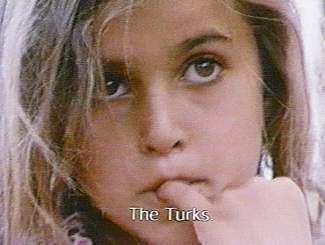 |
|
Little
refugee girl
|
“We simple folk. What can we do? We just want
to go back. And sleep in our own backyards.”
Some complain of their relatives being prisoners in Turkey. This is followed by a
headline in the “Cyprus Mail” stating “Agreement to Free All Prisoners.” (“Clerides
and... Denktash... have agreed on the release of all prisoners of war.”)
Well, what do you know! That implies the Greek side wasn’t the only one with
refugees and prisoners.
|
| |
In typical Orthodox propagandist fashion, we are not told about the
suffering of the other side. Furthermore, would any of this have ever happened if the
Greeks did not fire the first shot? Instead, Michael Cacoyannis tries to paint the picture
that the Turks acted brutally... but even he doesn’t offer much evidence that the Turks
murdered the Greeks being held. Sure, this kind of life disruption and displacement of
loved ones isn’t pretty, but if Michael Cacoyannis wanted to point the finger at a
guilty party, how dare he fully not lay the blame where it squarely belongs?
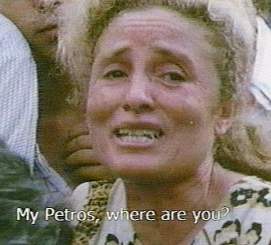 |
|
"My
Petros, where are you?"
|
Busloads of Greeks return, re-united with their loved ones. Michael
Cacoyannis focuses on one saying that he got beaten up by the Turks.
A museum director talks about the hardships brought on by the “war.”
A rally in Litmassol shows Greek Cypriots desiring the return of Makarios, and with
protest signs declaring no to partition. One reads “Yankee go home.”
A gunshot rings from the bell tower. Someone is shot. EOKA-B gunmen are blamed. One person
in the crowd cries, “We escaped the Turks, only to be killed by them.”
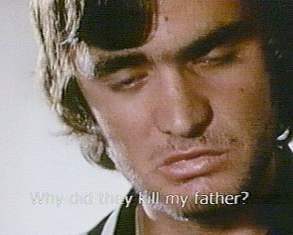 |
|
Young man
mourns the loss of his father by EOKA-B |
There is a heart-wrenching interview with a young man who relates
the killing of his bus driver dad... the victim of the above shooting.
One man who proudly displays nationalist posters, and who says perhaps the military
leadership in Greece might come back (he would prefer them over the communists) is asked
by the filmmaker whether he would also choose the communists over the Turks. He refuses to
answer.
A Mr. Moustakas, active member of EOKA-B, is interviewed. He says General Grivas was one
of the great Greek soldiers, giving his all for union with the motherland. When the
filmmaker challenges him that the present Greek government favors independence, the man
replies that he “can’t imagine a Greek government against Enosis.” If that
should happen, he would not accept it.
Another citizen states that “Any honest Greek Cypriot has to believe in Enosis.
Having Greek blood, we must belong to Greece. Whatever government is in power, junta or
democracy, royalist, left or whatever.”
Nikos Sampson is asked whether his appointment did not provoke the Turks. “On the
contrary,” the strongman replies. “I declared Cyprus would remain independent..
sovereign... unitary.... and inter-communal talks would continue, towards a peaceful
solution.” The filmmaker counters with, “That was the policy of Makarios.
Surely the aim of his overthrow was Enosis?” Sampson then lays blame on the “English
imperialists who abetted the invasion, and the US imperialists who more than abetted the
invasion.... and it is the view of the Turks to justify their unprovoked assault on our
island.” He precedes his words with “Honestly...”
Moustakas opines, regardless of the claims of the coup leaders, that “the Cypriots
believed that the coup meant Enosis. Events over the years argue against independence.”
Makarios answers the charge that he has used force and repression by stating he might have
“been too tolerant too often.” The amnesties he has granted was the offered
evidence.
|
Of the Barbarians Who
Invaded Us
|
We move on to why Greek Cypriot forces did not try
to repel the Turks. One soldier explains the officers abandoned them to be prisoners
of war. The policeman who got shot says the junta was in collusion with the Turks..!
Then the Americans are implicated. The politician Makarios is too afraid to venture
his opinion, but Clerides says the Americans must have known about the planned coup,
and therefore bear responsibility, as they had to have foreseen the Turkish
reaction. People carry anti-Kissinger signs. Sampson is challenged on whether he was
really a CIA agent, as Jack Anderson reported.
But what would have America’s motive have been? Makarios is asked whether the
United States desired to maintain bases in Cyprus, and he answers that he didn’t
think so. We can see in later years the USA doesn’t seem to have benefited by the
events in Cyprus. In fact, American politicians bowed to the Greek lobby and
penalized Turkey with the Cyprus embargo, even though Turkey was legally entitled to
act in the way it did... under Article IV of the Treaty of Guarantee.
The legality of Turkey’s action was upheld even by the Athens Court of Appeal in
March 21, 1979. Unlike Michael Cacoyannis, this court lay the blame where it
belonged: “The true guilty ones were the Greek Officers, who organised the coup
and thereby created the conditions for an intervention."
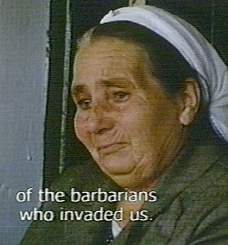 |
|
Does
she mean her own fascists? Nope.
(The speaker was
a Voice-over, not the
pictured woman.)
|
Next, Michael Cacoyannis goes into high gear by
showing up the brutality of the Turks. A seventy year old man dies after being hit
in the chest, once he surrenders his money. There were so many rapes, the abortion
law had to be changed. One woman claims the Turks killed 18 people.
At least one refugee says, “May God strike those who started it! They brought
ruin on us by rousing the Turks.”
Another: “If it wasn’t for those fascists, no Turk would have set foot here.”
And, again, that’s the entire point. No army can expect its soldiers to behave in
the most civil manner... sure, some of these country bumpkins with a rifle in their
hands are all going to act responsibly. (A jarring reminder was shown in footage of
American military boys in Iraq, thinking they were playing another video game, in
FAHRENHEIT 9/11.) Therefore, to focus on the violence some have suffered is not the
correct angle to pursue, unless one is interested in propaganda... and unless the
effect is to demonstrate the criminal cases were meant as a matter of policy. Or
maybe Michael Cacoyannis was trying to get his viewer to swallow the Turks were
guilty of yet another genocide that the Turks have become so famous for.
As the CYPRUS MAIL declared on October 27, 1995: “So now the truth is out. We
are not talking about 300 dead, or 45 dead, but 96 people killed during action in
1974.” This and other revelations in the Greek Cypriot press forced the Greek
Cypriot administration to lower the number of missing people from 1,619 down to
1,493. Most of the Greeks who died did so at the hands of other Greeks, a fact that
the West rarely focuses on... just like many of the Armenians who died (once their
revolutionary groups organized, during the 35-plus years before 1915) did so at the
hands of other Armenians. (During the three year stretch of 1904-07, two out of
three Armenians killed died at the hands of Armenians.)
(In the film, Makarios states 6,500 casuatlies, 3,500 of whom were dead. Of the
remaining 3,000 missing, “I doubt whether more than a few survive.” “Most of
the missing have been executed in cold blood.” In proportion with the USA, the
losses would equal “about 2,800,000.” Now that’s effective propaganda! In
later years, the number of dead would be calculated at 96... what a gap with “3,500.”)
|
| “25
years after” |
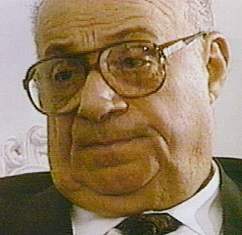 |
|
Turkish
Cypriot leader Rauf Denktash.
|
There is a “25 years after” epilogue where the filmmaker
interviews Turkish Cypriot leader Rauf Denktash on television, and the latter’s
respectably straightforward manner has him say, in response to Cacoyannis’ position of
1,619 “massacres” happening, that indeed, “by our people, in revenge,
unfortunately.”
Now THAT is the difference between the typically deceptive bovine secretions (i.e., B.S.)
we are accustomed to from the Orthodox crowd, and the brutally honest manner of the Turks.
Alas, in this case, Denktash is so interested in being fair, he reminds us that he is
really in no position to know exactly what has happened to all of those people. Cacoyannis
“rewinds” the admission for dramatic effect, and tells us in voiceover, “Over
1,600 people massacred, to quote Mr. Denktash (Holdwater:
Denktash did not “quote” that figure, which was no longer even the correct figure by
the time of this 2000 interview; he was just honestly admitting Turks did commit crimes),
must be buried, presumably in mass graves, somewhere in the Turkish occupied part of
the island. The question to which an answer should be given, not only in keeping with
international humanitarian standards, but for the sake of the families still clinging to
false hopes, is where.” (FADE OUT with a card featuring the word, WHERE?)
No doubt most, if not all, of these people are dead by now, and undoubtedly the Turks were
not innocent. However, already there has been a downgrading of these missing people by a
whopping 126, and as the Northern Cyprus Monthly editorialized, “It is very likely
that this number will drop even further, since hardly a month goes by without a new
shocking revelation being published in the Greek Cypriot press regarding the Greek Cypriot
‘missing persons’.”
So to answer Michael Cacoyannis’ question, WHERE?, perhaps Michael Cacoyannis ought to
look in the southern part of the island. Who knows how many more Greeks were killed by
fellow Greeks? (Let us now turn to the revealing “fraternal bloodshed” we
encountered much earlier.)
On April 17, 1991, Ambassador Nelson Ledsky testified before the U.S. Senate Foreign
Relations Committee that "most of the 'missing persons' disappeared in the first
days of July 1974, before the Turkish intervention on the 20th. Many killed on the Greek
side were killed by Greek Cypriots in fighting between supporters of Makarios and
Sampson."
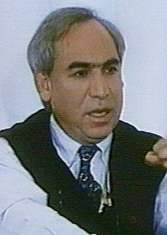 |
|
Michael
Cacoyannis in 2000 |
This downgrading to 1,493 occurred in 1995, yet Michael Cacoyannis
is still playing with the old 1,619 figure during his 2,000 interview... five years later.
Is he sloppy with his research, or intent on furthering his propagandastic agenda? Michael
Cacoyannis did an excellent job of focusing on the poor, suffering faces of the Greek
Cypriots, but NOT ONCE during his entire “personal testimony on film” did he seriously
explore the Turkish Cypriots who were terrorized and murdered, since the 1950s. Should we
not assume the Turks who moved up from the south were not hurt, and did not suffer losses?
(The director would do well to read the works of, and watch the
documentary ["The Voice of
Blood"] of fellow Greek Cypriot, Antonis Angastiniyotis.)
It’s the same old story. Just like at the end of WWI, when the Greek and Turkish
populations were exchanged, by mutual agreement. Today, we only hear about the Greeks who
were forced to leave, often equated in genocidal terms. That is because those like Michael
Cacoyannis can scrounge up the money to produce propagandistic matter as this, and find
distribution in the sympathetic West... distribution that can have a very long shelf life.
|
|